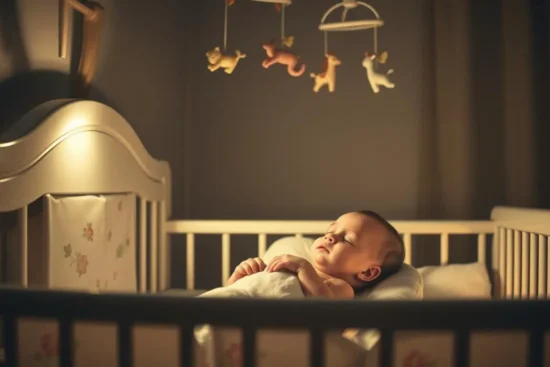
Can You Bring Baby Food on a Plane? Tips for Traveling with Infant Food?
Traveling with a baby can be both exciting and challenging. It’s especially true when figuring out the rules for bringing their food on a plane. This guide will help you understand TSA rules, packing tips, and airport security. We’ll cover how to bring pre-packaged purees, homemade baby food, or formula without stress.
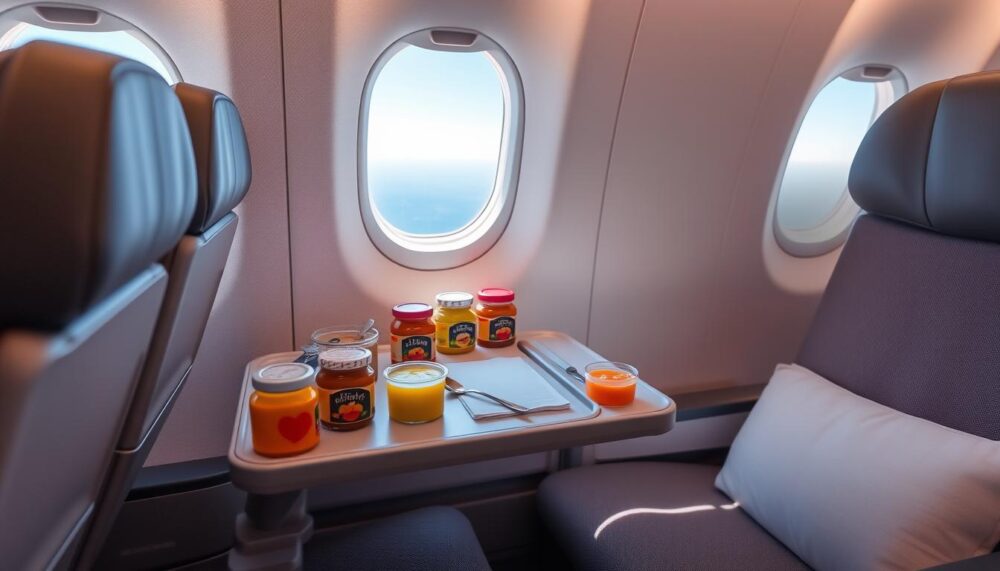
Key Takeaways
- The TSA allows passengers to bring baby food, formula, and breast milk through airport security in reasonable quantities.
- You can pack baby food in your carry-on or checked luggage, but it will need to be screened separately from your other items.
- Bringing infant meals on a flight can help ensure your baby is well-fed and comfortable during the journey.
- Be prepared to show the items to security and have them tested if necessary.
- Packing in spill-proof containers and bringing extra supplies can help minimize messes and keep your baby’s food fresh.
Understanding TSA Rules for Baby Food on Planes
Traveling with a baby can be tough, but knowing TSA rules for baby food on planes helps. The TSA has rules to keep everyone safe and help families with babies. These rules make traveling easier for families.
Permitted Items and Quantity Limits
The TSA lets you bring baby food, formula, and breast milk through security. These items are baby food exemptions at the airport and don’t count as liquids. But there are limits on how much you can bring.
You can bring enough for your trip, but pack only what you need for the flight. This avoids any problems.
Screening Process for Baby Food and Liquids
The screening for airport security baby purees and liquids is different. You’ll need to take these items out of your bag and put them in a bin. TSA agents might ask you to open them for inspection.
Being ready for this helps. Make sure your baby food and liquids are easy to find in your carry-on.
| Permitted Items | Quantity Limits |
|---|---|
| Baby food, formula, and breast milk | Enough for the duration of your trip |
| Juice and water for infants | Reasonable amount for the flight |
| Gel or frozen items, such as teething rings | Reasonable amount for the flight |
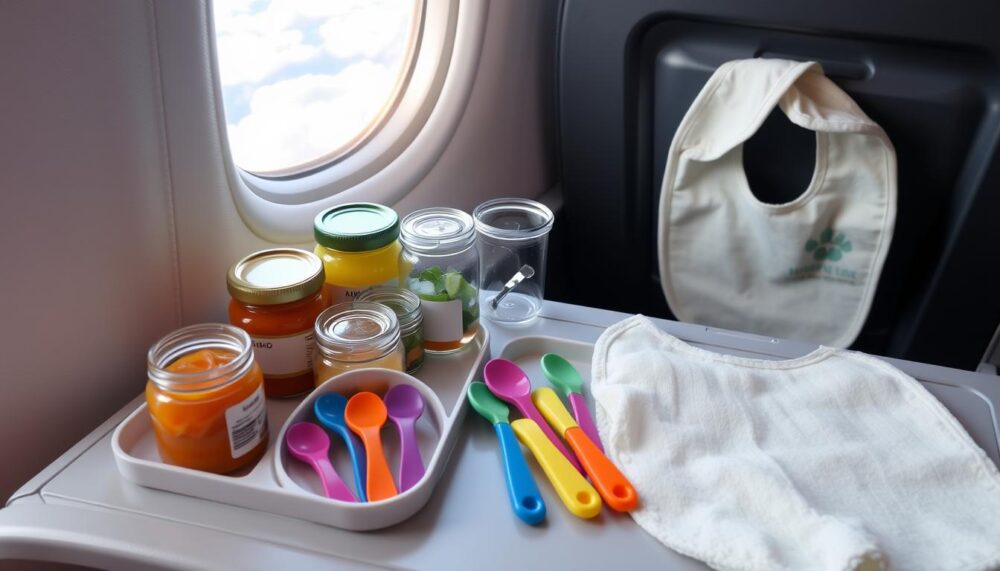
Knowing the TSA rules for tsa rules baby food makes traveling smoother. Follow the screening steps for a hassle-free trip with your baby.
Preparing and Packing Baby Food for Air Travel
Traveling with an infant can be challenging. But, with the proper steps, packing baby food for air travel becomes easy. It’s all about picking the proper containers and keeping the food fresh and safe during the flight.
Choosing Suitable Food Containers
When picking containers for packing baby food for air travel, think about these points:
- Leak-proof and spill-proof containers to prevent messes
- Insulated bags or coolers to keep food at the right temperature
- Small, individual portions to avoid waste and make feeding easier
- Containers that are easy to carry and fit in your carry-on
Tips for Keeping Baby Food Fresh and Safe
To keep your carry-on baby food and flying with infant meals fresh and safe, follow these tips:
- Pack perishable items in an insulated bag with ice packs
- Bring pre-portioned, shelf-stable foods that don’t need refrigeration
- Label and date all containers to keep track of expiration
- Avoid packing items that may spill or leak during the flight
By carefully preparing and packing your baby’s food for air travel, you can ensure they have nutritious and safe meals during the trip.
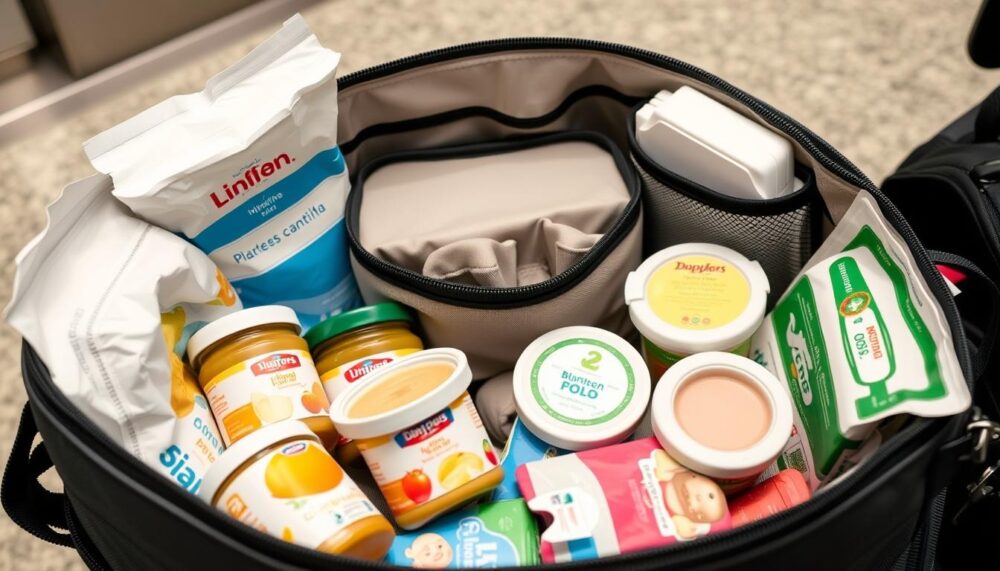
Can you bring baby food on a plane?
Yes, you can bring baby food on a plane. The Transportation Security Administration (TSA) lets parents and caregivers carry baby food, formula, and liquids through security. But there are some rules to follow for a smooth trip.
You can carry canned, jarred, or pouch baby food in your carry-on. There’s no limit on how much, as long as it’s enough for your trip. You can also bring formula, breast milk, and juice without limits as long as it’s checked at security.
- All baby food and liquids must be presented for inspection at the security checkpoint.
- You may be asked to remove these items from your carry-on bag for extra screening.
- Baby food and liquids are exempt from the 3-1-1 liquid rule for other carry-on items.
By following these rules, you can bring baby food on a plane. This way, you can ensure your little one is well-fed during your flight. Pack enough for your trip and bring different foods to meet your baby’s tastes and needs.
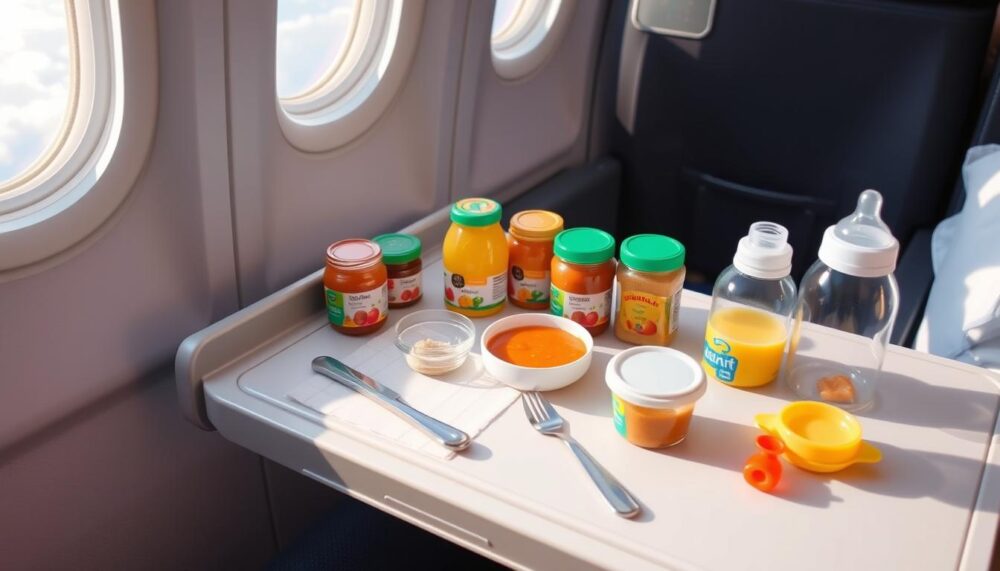
Navigating Airport Security with Baby Food
Going through airport security with baby food can be easy with the right steps. Knowing the TSA rules and following them can make your journey smoother.
Separating Baby Food for Screening
When you’re at airport security, keep your baby’s food separate from other things. This makes it easier for TSA agents to check these items. Here’s what you need to do:
- Put all baby food, formula, and liquids in a clear, quart-sized bag for easy access and screening.
- Keep these items separate from your carry-on luggage and personal items.
- Tell the TSA agent that you have airport security baby purees or other TSA rules for baby food items that need to be screened.
- Be ready to remove the baby food bag from your luggage and put it in a bin for X-ray screening.
By separating and presenting your baby’s food items early, you can speed up the screening process. This helps avoid any delays.
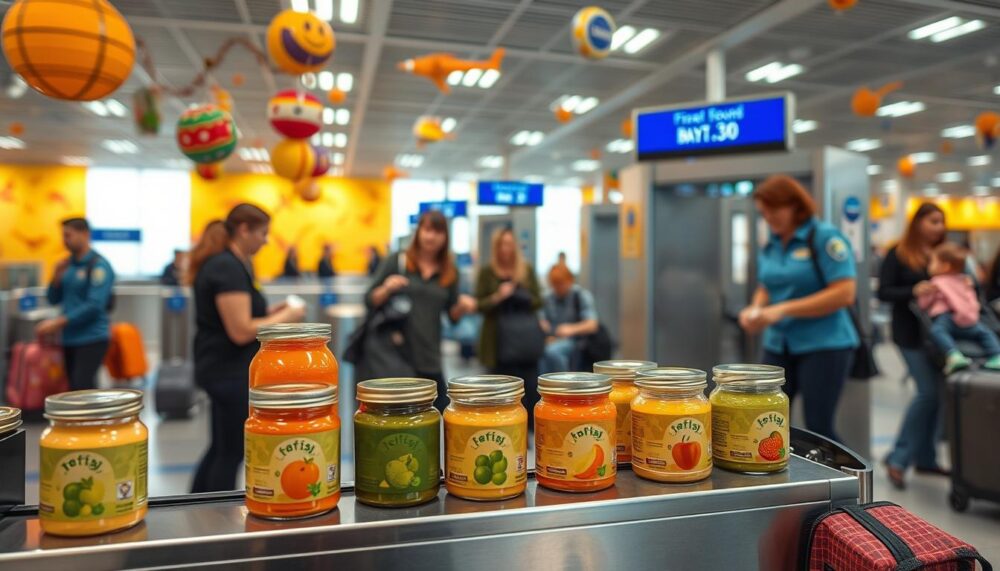
“Preparing your baby’s food and supplies for airport security can seem daunting, but with a little planning, it can be a hassle-free experience.”
The TSA’s main goal is to keep everyone safe. They might need to check your baby’s food more closely. Stay patient and follow their instructions, and you’ll get to your destination soon.
Feeding Your Baby During the Flight
Traveling with an infant can be challenging, but feeding them during the flight doesn’t have to be. A bit of planning and preparation can help keep your baby nourished and comfortable.
When it comes to flying with infant meals, timing is everything. Feed your baby right before boarding to avoid messes during the flight. If they get hungry, offer a bottle or nurse during takeoff and landing. This helps their ears adjust and prevents discomfort.
For older infants on solid foods, pack a variety of flying with infant meals. Choose non-perishable items like pureed fruits and veggies, cereal, or soft-cooked chicken or fish. Don’t forget utensils, bibs, and a portable feeding surface to keep things clean.
| Feeding Tip | Benefit |
|---|---|
| Feed before boarding | Reduces the risk of in-flight messes |
| Offer a bottle or nurse during takeoff and landing | Helps regulate the baby’s ears and prevent discomfort |
| Pack a variety of flying with infant meals | Ensures your baby has a balanced diet during the flight |
Every baby is unique, so be ready to adjust your feeding plan as needed. With creativity and patience, you can make feeding your baby during the flight a breeze.
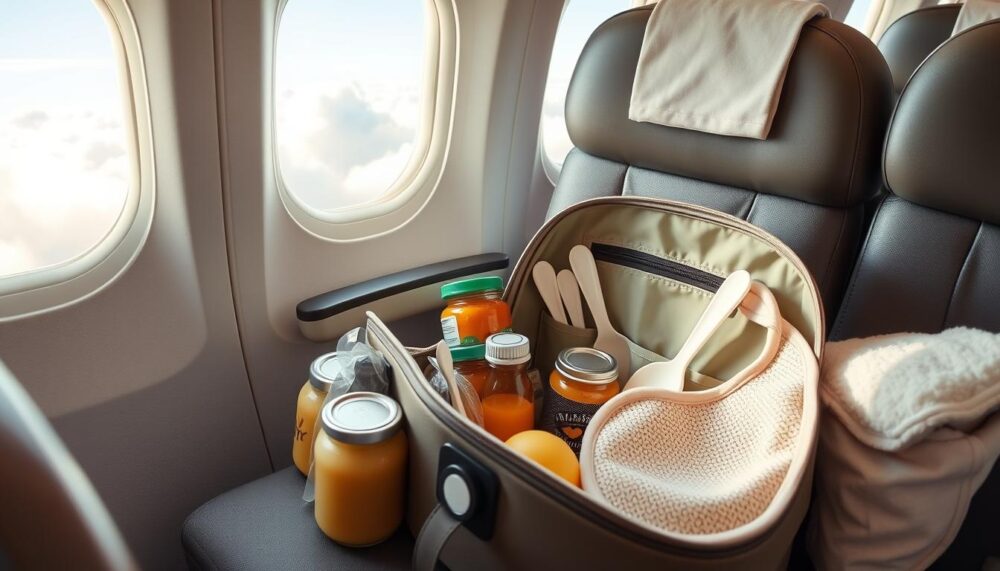
Baby Food Restrictions for International Flights
Traveling with an infant can be a unique challenge, especially when it comes to navigating the regulations around bringing baby food on international flights. The Transportation Security Administration (TSA) in the United States has specific guidelines for carrying infant meals on domestic flights. However, the customs and declaration processes for crossing international borders can vary significantly.
Customs Regulations and Declarations
When flying internationally with your little one, it’s essential to be aware of the customs regulations in your destination country. Some nations may have strict limitations on the type and quantity of baby food you can bring into the country. In many cases, you’ll be required to declare any infant meals or formula you’re carrying during the customs process.
- Research the specific customs requirements for your destination country before your trip.
- Be prepared to provide a detailed list of the baby food items you’re carrying and their quantities.
- Keep all baby food items easily accessible in your carry-on luggage for quick inspection during customs.
| Destination Country | Baby Food Restrictions | Customs Declaration Required |
|---|---|---|
| United Kingdom | No restrictions on the type or quantity of baby food, but it must be declared. | Yes |
| Japan | Limit of 1 kg (2.2 lbs) of baby food per infant. Certain types of baby food may be prohibited. | Yes |
| Australia | No restrictions on the type or quantity of baby food, but it must be declared. | Yes |
Remember, staying informed about the specific requirements for your destination can help ensure a smooth and stress-free international travel experience with your little one.
Handling Baby Food Emergencies on the Plane
Planning and packing your baby’s meals can make flying smoother. But unexpected things can still happen. Spills, spoiled food, or changes in appetite can be tough. Being ready for these baby food emergencies helps keep your baby happy and comfortable.
Stay calm if something goes wrong. Panicking can make things worse. If there’s a spill, clean it up with baby wipes and extra bibs. This keeps everyone safe and avoids slipping hazards.
If the food is spoiled or expired, don’t feed it to your baby. Throw it away and offer something else. You can use a pre-packaged snack or another homemade meal. Remember, flying with infant meals and baby food allowed on flights is okay.
If your baby doesn’t want to eat, don’t worry. Babies can be picky. Try different foods or drinks to keep them hydrated. If all else fails, ask the flight attendants for help.
Stay calm, be prepared, and think of solutions. This way, you can handle any baby food emergencies on the flight. With patience and quick thinking, you can meet your baby’s needs and make the trip smoother.
“The key to handling in-flight baby food emergencies is to stay calm and have a plan B ready. With a little preparation and quick thinking, you can turn a potential disaster into a minor hiccup.”
Tips for Minimizing Messes and Spills
Traveling with a baby can be messy, especially during feeding times. But there are steps you can take to reduce messes and spills on your flight. It’s vital to pack extra carry-on baby food and supplies like bibs and wipes. This keeps your baby clean and comfortable.
Packing Extra Bibs and Wipes
When flying with infant meals, pack more bibs and wipes than you think you’ll need. Babies can be unpredictable, and spills happen often during flights. Having lots of clean bibs and wipes helps you clean up fast, keeping everything tidy.
- Pack at least one bib per feeding, plus a few extra in case of multiple spills.
- Choose bibs with absorbent, easy-to-clean materials like terry cloth or silicone.
- Bring a travel pack of baby wipes, as well as a small, resealable bag for used wipes.
- Consider packing a small, portable changing pad or mat to make cleanup easier.
Being prepared with the right supplies can make in-flight feedings less stressful. This way, you and your baby can enjoy a smoother, more comfortable journey.
| Item | Quantity | Purpose |
|---|---|---|
| Bibs | 1 per feeding, plus extras | Absorb spills and keep baby clean |
| Baby wipes | Travel pack | Clean up messes quickly and easily |
| Changing pad | 1 | Provide a clean, comfortable surface for diaper changes |
Making the Most of Layovers with an Infant
Traveling with a baby can be fun, but layovers need a plan for meals. Being ready and proactive helps keep your baby fed and happy while flying with infant meals and packing baby food for air travel.
First, check the airport’s facilities before you go. Find family restrooms or nursing rooms for quiet feeding. Also, look for baby-friendly restaurants and cafes near your gate for quick meals or snacks.
- Bring a mix of packing baby food for air travel, like shelf-stable and fresh items. This way, you can feed your baby easily during the layover without needing a fridge or microwave.
- Get a small, insulated lunch bag or cooler for your flying with infant meals. It keeps food at the right temperature until it’s time to eat.
- Think about bringing a portable high chair or booster seat. It makes mealtime safer and more comfortable for your baby, reducing the chance of spills or accidents.
Plan ahead to make your layover stress-free and fun. With some preparation, your baby will stay happy and full, letting you enjoy the journey too.
| Airport Amenities | Nearby Dining Options |
|---|---|
| Family restrooms | Baby-friendly restaurants |
| Nursing rooms | Cafes with high chairs |
| Changing stations | Takeout for on-the-go meals |
“Preparation is the key to a successful layover with an infant. By thinking ahead and packing the right supplies, you can turn a potential challenge into a smooth and enjoyable experience.”
Conclusion
Bringing baby food on a plane is easier than you think. Just follow the TSA rules and pack smart. This way, you and your baby will have a worry-free trip.
Plan ahead, bring extra stuff, and ask for help if you need it. This makes traveling easier, no matter where you’re going.
Traveling with baby food allowed on flights is straightforward. Just go through security, pick the right containers, and keep food fresh. This lets you enjoy the trip with your family.
With some prep and a positive attitude, you can handle any travel issues. So, get your bags ready, pack your baby’s food, and start your journey with confidence.
FAQ
Can I bring baby food on a plane?
Yes, you can bring baby food on a plane. The TSA lets you carry formula, breast milk, and baby food through security. But there are rules you need to know.
What types of baby food are allowed on flights?
The TSA says you can bring jarred or pouched purees, cereal, and solid foods. Liquid or gel baby food, like yogurt or applesauce, is okay too. But it must be 3.4 ounces or less and fit in a clear bag.
How much baby food can I bring on a plane?
There’s no limit on how much baby food you can bring. But, the TSA suggests bringing only what your child will eat. It’s smart to pack extra for delays.
How do I get baby food through airport security?
To make screening easy, keep baby food separate from other carry-ons. Use a clear bag for liquids or gels. You might need to show it for extra checks.
Can I bring frozen or refrigerated baby food on a plane?
Yes, you can bring frozen or refrigerated baby food. Just keep it in a cooler with ice packs. The TSA might ask to open it for inspection.
How should I pack baby food for air travel?
Pack baby food in sturdy, spill-proof containers. Use insulated bags or coolers for temperature control. Bring more than you think you’ll need, and pack extra supplies like bibs and wipes.
What should I do if I have a baby food emergency on the plane?
If there’s a spill or your baby’s food spoils, stay calm and tell the flight attendant. They can help with extra napkins or cleaning up. Bring extra bibs and wipes to avoid messes.
Are there any special considerations for bringing baby food on international flights?
When flying internationally, know the customs rules and declare baby food. Some countries have food restrictions, so check with the airline or customs before your trip.

